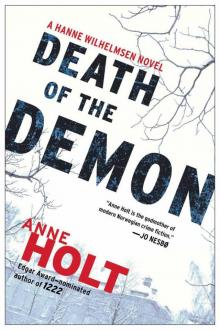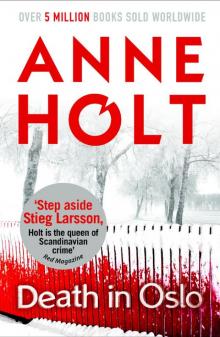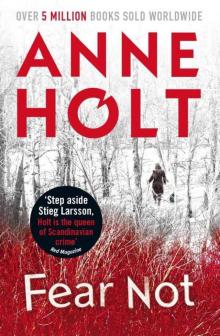1222 Read online
Page 6
‘I don’t care how bad your handwriting is,’ I said.
‘I can’t,’ he said. ‘Anyway, why should I?’
‘Because I’m asking you nicely. And because it’s actually important to me. And because I think you’re a really sweet, lovely boy, deep down.’
At least he was old enough to appreciate irony. He could smile. Chocolate came frothing out of the dispenser.
‘Sweet and lovely,’ he repeated. ‘Absolutely.’
He burnt his mouth on the hot drink.
‘Paper,’ he said, sucking cool air onto his tongue.
‘There’s bound to be some over there,’ I said, pointing towards the reception desk. ‘And a pen.’
He shrugged his shoulders and ambled across the floor with the cup in his hand. He was still wearing the tight woollen sweater that made his upper body look small and misplaced on top of the wide jeans that were far too long.
I heard footsteps on the stairs. At first I thought the noise was coming from outside.
‘What are you doing here?’ said Adrian in a churlish tone of voice. ‘Can’t you tell the time, or something?’
In spite of this, Magnus Streng nodded pleasantly at the boy as he walked across the room, followed by Geir Rugholmen, and stopped in front of me.
‘I hear you’ve been informed,’ he whispered. ‘It would be a great help if you could come with me to the kitchen to take ... a closer look at the whole thing.’
‘I’ve already seen everything worth seeing,’ I said quietly, keeping an eye on Adrian who was searching rather too intrusively behind the reception desk.
‘Adrian! You’re supposed to be finding some paper, not poking around in other people’s belongings!’
‘Please? I’d really appreciate it.’
Dr Streng was persistent. I hesitated for a moment, turned my chair around and gestured towards the kitchen door, where a large metal sign informed us:
It is dangerous to go near the electrical wiring with a fishing rod or line.
Adrian was left alone once again.
When I got back it turned out that he had made a remarkable list. First of all, it was packed with detail. He hadn’t observed every single passenger as they arrived at the hotel, but he had written a precise description of some fifty passengers and what they had brought with them from the train. Adrian had only named six of them, which was perfectly reasonable; he hadn’t known anyone before the train crashed. The rest were so accurately described that I immediately knew to whom he was referring. The boy was unusually observant, particularly in view of the fact that he walked around with his cap pulled down over his eyes the whole time. It was also clear that he had the ability to work quickly; I could hardly have been away for more than forty minutes.
However, the most remarkable thing of all was the appearance of the list. His handwriting was as elegant and even as if it had been print, with a style that has not been taught in Norwegian schools since before the war. Although the paper was blank and unlined, it looked as if Adrian had used a ruler. There were full stops and straight margins, graceful loops and beautiful capitals, like something from a textbook on calligraphy. Nor could I find one single spelling mistake in the six-page document.
But I knew nothing of this as I followed Dr Streng and Geir Rugholmen into the kitchen. The only thought that struck me as I glanced at the boy for the last time before the door closed behind me was that I would really like to know what time he had settled down to sleep on the window seat.
I was hardly the only one who had heard what he said when Cato Hammer was standing on the table holding what was to be his last address to a large congregation.
I could only hope that no one had taken much notice of Adrian’s outburst.
No one apart from me, I mean.
vi
‘Actually, I think he was a good man,’ said Dr Streng as he slowly moved around Cato Hammer’s corpse with his rolling gait. ‘Even though he did a lot of stupid things. He had his demons, that’s for sure. From time to time he struggled terribly. Both with his God and the one downstairs.’
‘It sounds as if you knew him,’ I said.
The doctor didn’t reply. He merely nodded slowly and meaningfully as he examined details on the dead body. The nose, with its strange, bluish-yellow colour. The eyes, which were open, frighteningly. I knew I had closed them earlier. He stopped by the damaged arm and leaned forward, looking at it closely. Geir Rugholmen hastened to explain his little accident while moving the body. Dr Streng waved his right hand airily and moved on.
‘I am bound by my vow of patient confidentiality,’ he said eventually, without taking his eyes off the corpse. ‘But given the circumstances, I can tell you that Cato Hammer was once my patient. Just a few years ago, in fact. I had quite a small private practice alongside my post at the university. Since I can safely say that Cato Hammer’s needs when it came to medical treatment lay outside my field of competence, I referred him on after two or three consultations.’
He stopped, placed his hands on his back and rocked back and forth on the balls of his feet. He reminded me of a penguin on patrol.
‘Mmm,’ he said several times; I hadn’t a clue what he was confirming to himself.
‘What was it?’ I asked.
‘Sorry?’
Streng sounded surprised.
‘What was he suffering from?’
‘The incurable loneliness of the soul. Yes indeed.’
‘He didn’t exactly seem to be lonely,’ mumbled Geir.
‘I am talking about the spirit, my good man. About cracks in the soul. About the eternal inner struggle between good and evil. Or in Cato Hammer’s case, between God and Satan. It’s not easy, that kind of thing. Not easy at all.’
Well I never, I thought, but managed to hold my tongue.
‘I referred him to a psychiatrist,’ said Streng after taking a deep breath. ‘Even though I was of the definite opinion that the best thing for him would be to talk to an educated and experienced theologian. Which I told him, in fact. But it didn’t help. I think he simply didn’t dare to go down that road.’
Silence descended over the kitchen, as if we were all rather embarrassed to have learned that the boastful TV celebrity Cato Hammer had been in need of psychiatric help.
‘It would have been helpful ...’ said Dr Streng so suddenly that I jumped. Then he stopped. Peered at the bullet hole. His head was just on a level with the corpse, but he didn’t look for anything to stand on. ‘It would have been helpful,’ he repeated, ‘if someone had taken the trouble to check the temperature of the body when he was found.’
Geir caught my eye. A little twitch at the corner of his mouth was all he allowed himself. And he didn’t give me away. Instead he shrugged his shoulders apologetically and said: ‘There are only electronic thermometers here in the hotel. For medical use, I mean. And we didn’t think it was a good idea to take the temperature inside the ear of a corpse.’
‘Hmm,’ said Streng. ‘But the best thing would have been the liver. A meat thermometer would have done the job perfectly. There must be one of those around, surely? I mean, the brain is a bit of a mess,’ carefully he lifted Hammer’s head and examined the brutal exit wound, ‘so the simplest method, which is to shove the thermometer up here ...’ he pointed at the priest’s nostril, ‘and into the brain would presumably have told us very little. When was he brought inside?’
Geir looked at his watch. ‘Just over an hour ago.’
‘It’s quite simple to work out, actually,’ said Magnus Streng. ‘In principle it takes twenty-four hours to halve the difference in temperature between the body and its surroundings. In other words, if it’s minus twenty-five outside and we start with the premise that Hammer was an active, healthy man with a body temperature of thirty-seven degrees, then the difference will be ...’
‘Sixty-two degrees,’ I said.
The doctor smiled and nodded.
‘In other words, twenty-four hours in the snow would give our
man here a core temperature of six degrees,’ I added. ‘Thirty-seven minus half of sixty-two, which is thirty-one. Six degrees. I’d call that dead. But he wasn’t lying out there for that long. And he’s been lying in here for a while. And he was partly covered by snow, which protected him. Plus the strong wind out there is an uncertain factor when it comes to the actual temperature. Plus ...’
Streng smiled again and held up his chubby hands.
‘I got your point quite some time ago.’
Berit Tverre came into the kitchen. She was out of breath, and hadn’t got round to removing all her outdoor clothes. Her voice almost disappeared as she made her way around the partition screening off the washing-up area, struggling to take off her capacious anorak.
‘It’s pointless. I’ve tried three times. The first time, Mr Cabbage Head was completely covered in snow in four and a half minutes. The second time it took almost quarter of an hour. The last time it happened so fast I didn’t even have a chance to check how long it took.’
‘Ergo,’ I said, ‘in this case we will just have to rely on good old tactical work.’
‘Which should be easy, according to you.’
I looked enquiringly at Geir.
‘That’s what you said when you were in here earlier,’ he insisted. ‘You said this investigation would be incredibly simple. Or something along those lines. Is that what you think?’
I nodded.
‘We have a very limited number of suspects, all of whom are trapped up here. A limited geographical area to examine, to put it mildly. I think the murder will be cleared up in a day or two. Once the police have taken over, of course. I mean, they have to make a start first.’
‘But in the meantime ...’ Berit Tverre said hesitantly.
‘In the meantime you can do as I said, and fetch one of the police officers I assume are in the top apartment. Or you can do what you’ve told everybody else to do, just chill out and relax. This storm has to die out at some point.’
In the meantime, I thought, there’s a murderer with a heavy-calibre weapon wandering around amongst us. In the meantime we can only hope that the intention of the person in question was to kill Cato Hammer, and that he or she would not dream of harming anyone else. While we are waiting for the police, I thought without saying anything, we could pray to the gods every one of us must believe in that the perpetrator was rational, focused, and did not suspect any of us of knowing who he or she was. And that he or she would have no reason to suspect that anyone might be starting to investigate the case here and now.
‘Take it easy,’ I said. ‘Everything will be fine.’
i
I was definitely getting rusty.
When Adrian gave me the list he had made, I was impressed. The only problem was that I couldn’t work out what I wanted it for. Perhaps I had hoped it would be complete when I asked him to do it. I took the fact that I could even think such a thing as an indication that I was further away from the Oslo police district than I had felt in many years. And not just literally.
The document would have been useful if it had contained a complete overview of all the passengers and what they had brought with them from the train. The compilation of such a list presupposed that someone had been given the task before people started arriving at the hotel. A thorough registration process, like in a prison. The papers the boy handed me with an embarrassed gesture barely supplied more than the obvious. Their artistic appearance was impressive, and they told me something new about Adrian.
‘Thank you,’ I said, and meant it.
‘OK.’
I looked up at him when I had finished going through the list, folded the sheets and tucked them in a pocket on the wheelchair. He just stood there looking awkward with his hands dangling by his sides, his eyes downcast.
‘You did have someone,’ I said. ‘In spite of everything. So did I. For me it was wooden houses.’
‘What?’
‘For me it was cottages built of wood. I had a neighbour when I was a child. He was a carpenter. A caretaker. To be honest, he was the only person who was really there for me. The other adults around me didn’t waste much energy on my existence. But I’m bloody good at building wooden houses.’
Adrian looked sceptically at my chair.
‘Was.’ I corrected myself with a nod. ‘I was good at building wooden cottages. Bloody good.’
‘What’s the list for?’
‘It could be useful. Who did you have? Who taught you this? This fantastic, elegant handwriting?’
‘Has something happened?’
He was scraping at the worn, uneven floorboards with his shoe.
‘Yes.’
‘What?’
I was saved from coming up with an answer. Geir Rugholmen rushed in, grabbed hold of my chair without a word and pushed me towards the kitchen. Adrian followed a few steps behind, but stopped dead when Geir snapped at him.
‘I don’t like being pushed,’ I said as the door closed behind us.
I could see that the corpse had disappeared. Since they couldn’t have taken it through reception without my seeing them, I assumed they had used the walk-in freezer. On the other hand, I wasn’t really sure whether there might be another way out of the kitchen.
The thought of the freezer reminded me how hungry I was, and I placed a hand on my stomach.
‘Now listen,’ said Geir, placing himself directly in front of me. ‘Listen to me.’ His voice was higher than usual. ‘I did what you said.’
He coughed and crouched down so that his head was lower than mine, but I didn’t really know if it was a great deal better than looking up at him.
‘I went up to the top floor. There are actually three apartments, numbers seventeen, eighteen and nineteen. They’re all on the same corridor. And there’s a guard up there.’
As if he wasn’t sure whether I was listening properly, he waited for a reaction before he was prepared to carry on.
‘I see,’ I said, shrugging my shoulders. ‘A guard. With all this secrecy, that shouldn’t really surprise you. Of course there’s a guard.’
‘An armed guard.’
There are a few individuals who have really known me. Not many, of course, and until I was twenty it was only the carpenter who lived next door who sometimes made an honest attempt to see who I was. Since then, many have tried. Far too many, an exhausting number in fact, but I have been strong enough to prevent most of them from succeeding. When I started to run out of strength, I stopped letting anyone try.
But there are a few. They’ve all said the same thing, complaining and accusing me. Hanne shuts down. In any discussion, from a noisy quarrel to the simplest conversation, sooner or later I reach a point where I no longer have anything to contribute. Usually sooner, so they say. Always too soon, they’ve all said.
But I always think best alone.
‘Hello!’
Geir placed a hand on my arm and shook me.
‘Did you hear what I said? There’s an armed guard in the corridor outside the three apartments on the top floor!’
‘What sort of weapon is he carrying?’ I said into thin air, mostly in order to have something to say.
‘How the hell should I know! A rifle. Or an automatic rifle. Or an automatic pistol maybe; it looked like something in between.’
‘Haven’t you done military service?’
‘Community service. I pushed old people around in their wheelchairs in a care home.’
‘Don’t you hunt?’
‘No I bloody don’t! I know nothing about guns, but even my five-year-old son would have realized he was carrying a gun.’
‘Was he a Norwegian?’
‘What?’
‘Was this armed man a Norwegian?’
‘Of course he was a Norwegian! It’s hardly likely that some foreign squadron has been scrambled out here at Finse, is it!’
‘They have squadrons in the air force and the navy,’ I said. ‘Not in the army. And anyway, we’re not really talk
ing about the military here, are we. How do you know he was a Norwegian?’
Geir stood up and sighed demonstratively.
‘He spoke Norwegian. He looked really Norwegian. In other words, he was totally Norwegian.’
‘What did you talk about?’
This was actually beginning to resemble a conversation, and Geir calmed down slightly. He looked around for somewhere to sit.
‘I said hello,’ he said, and hitched himself up on the work surface that until quite recently had been the resting place for the remains of Cato Hammer. ‘And then I introduced myself. I didn’t get any further.’
He waited in vain for my response.
‘He just told me to go away,’ he continued impatiently.
‘Did he aim the gun at you?’
‘Did he ... No. He told me very firmly to go away. I had only just got through the door, and I half-closed it before I tried to say anything else. He interrupted me and repeated the order. Go away. That’s what he said. Several times.’
This was the final, irrevocable proof that the royal family were not in Finse on this stormy February night. They would neither need nor demand such protection. The question now was who did.
The answer that immediately struck me was terrifying.
An enormous crash made me jerk back in the chair so suddenly that I almost tipped it over.
The cold rushed in through the broken window, and it took only a few seconds before the floor was covered with snow several metres inside the room. The air turned dirty white with whirling snow and howling wind, and I found it difficult to breathe. Berit Tverre came racing in. Glass and paper swirled around the room, and I bent forward in my chair with my hands linked behind my head, as if I were in a plane that was about to crash and could do nothing more than hope for the best. I had noticed that there were a dozen or so scoops and ladles hanging from a pole beneath the fan. Now they were flying around the room, and one of them almost hit me on the head.
In the old days I had a good sense of time.
I could pinpoint a given period of time with great precision, without using my watch. It was useful. That ability, or perhaps it was more a question of intuition, has disappeared. I get mixed up. I fumble and I have no idea how long it was before silence fell once more. The storm was still roaring, of course, but at least it was on the right side of the wall. Compared with the raging bedlam when the window caved in, this was total silence.

 A Grave for Two
A Grave for Two Dead Joker
Dead Joker Death of the Demon: A Hanne Wilhelmsen Novel
Death of the Demon: A Hanne Wilhelmsen Novel Punishment aka What Is Mine
Punishment aka What Is Mine Beyond the Truth
Beyond the Truth Death in Oslo
Death in Oslo The Blind Goddess
The Blind Goddess What Never Happens
What Never Happens 1222
1222 In Dust and Ashes
In Dust and Ashes Odd Numbers
Odd Numbers What is Mine
What is Mine What Dark Clouds Hide
What Dark Clouds Hide Blessed Are Those Who Thirst
Blessed Are Those Who Thirst Fear Not
Fear Not No Echo
No Echo Hanne Wilhelmsen - 01 - The Blind Goddess
Hanne Wilhelmsen - 01 - The Blind Goddess